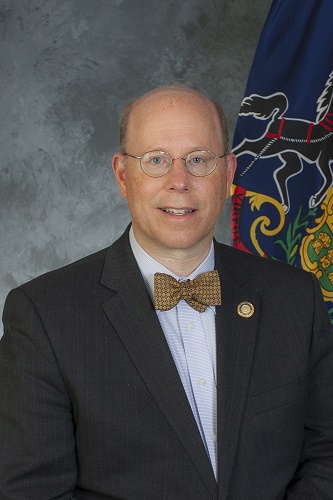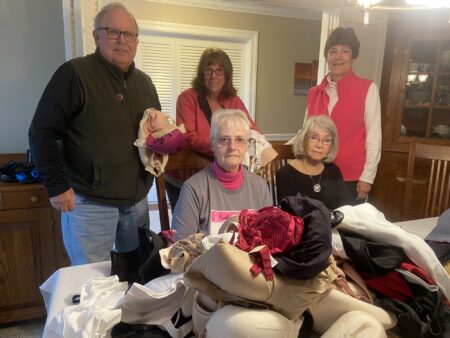CHAMBERSBURG — A panel of four state legislators gathered to discuss issues regarding transportation, the opioid crisis, workforce shortages and more with the business community during the 7th Annual Franklin County Legislative Breakfast held recently in Greencastle.
Hosted by the five chambers of commerce on behalf of the Franklin County Government Affairs Committee and sponsored by Patriot Federal Credit Union, more than 275 people attended the event to hear from Rep. Rich Irvin, Rep. Rob Kauffman, Rep. Paul Schemel and Rep. Jesse Topper.
“We are proud to host this event that enables our business community to engage with public officials and discuss significant issues impacting our region,” said Stephen Christian, president of the Greater Chambersburg Chamber of Commerce. “We appreciate the questions offered by the audience and the legislators delivering candid answers about complex issues.”
Moderated by Clint Barkdoll, partner at Kulla, Barkdoll, & Stewart, P.C., the audience submitted questions to learn more about the progress being made on various local issues. Barkdoll first asked about the possibility of expanding I-81. The legislators noted the recent fuel tax is funding infrastructure improvements like bridges and roadways, but it does not provide the billions needed to expand I-81. Rep. Irvin noted electric vehicle owners do not contribute to the fuel tax and legislators are looking for ways to help fund additional road maintenance.
Barkdoll also asked the panel for their viewpoint on the state placing restrictions on selling personal data. Kauffman and Irvin expressed some limitations may be beneficial if it was not business prohibitive. In addition, Schemel believed allowing the private market to address the problem would lead to the best overall solutions.
With more than 5,300 drug overdoses in Pennsylvania annually, Barkdoll asked the legislators to comment on how to best combat the growing opioid crisis. Topper strongly advocated for a greater focus on education while Kauffman indicated harm reduction strategies are an effective method to help addicts.
Kauffman updated the audience on legislation that would legalize fentanyl test strips, a harm reduction strategy. The strips allow addicts to check if a drug is fatal prior to using; the hope is addicts will seek help before a fatality happens. Kauffman was optimistic the legislation would pass in the Senate and be signed by Governor Wolf within the next week.
The legislators also discussed the state of liquor license acquisition. Schemel pointed out recent reforms are slowly enabling new businesses to acquire liquor licenses, but the main complexity is refraining from undercutting those businesses that paid large sums to acquire a liquor license. The legislators agreed small reforms are the best approach to solving the issue.
Other topics included educational curriculums and funding for social and emotional learning. Topper recognized parents and grandparents are more invested in a child’s education than ever before. He encouraged attendees to maintain the momentum that leads to local-level educational reform. Topper remarked the state has recently earmarked $100M for schools to invest in the rising social and emotional needs of their students.
The event concluded with the panel discussing the labor shortage and immigration. The panel agreed shifting the mindset from college to career tech programs will help provide a stronger labor force. Although immigration is a federal issue, Kauffman and Schemel indicated a more robust green card program would help increase the immigrant workforce that agriculture and other sectors rely on.
Special thanks to Grand Sponsor Patriot Federal Credit Union, the members of the Franklin County Government Affairs Committee as well as the representatives from the Greater Chambersburg Chamber of Commerce, Greater Waynesboro Chamber of Commerce, Greencastle-Antrim Chamber of Commerce, Shippensburg Area Chamber of Commerce and Tuscarora Area Chamber of Commerce.





















